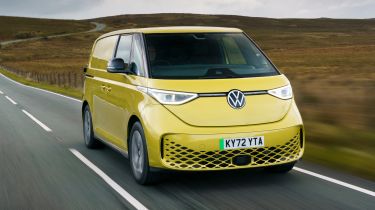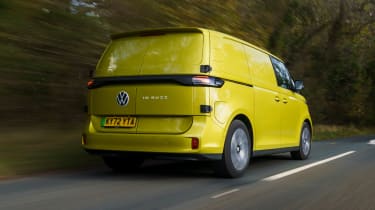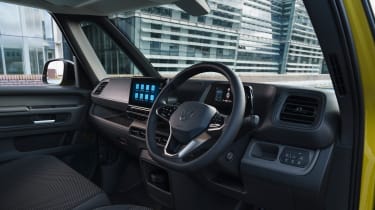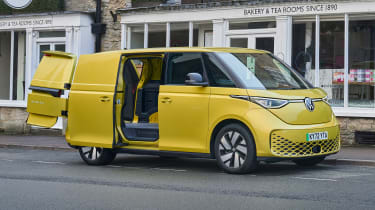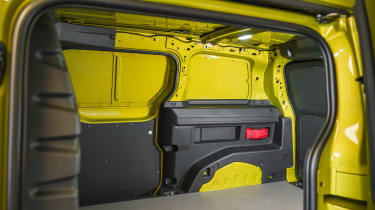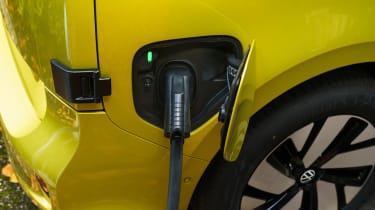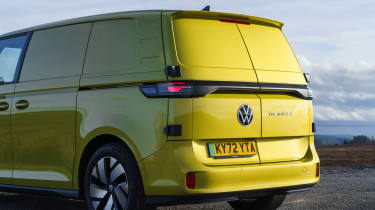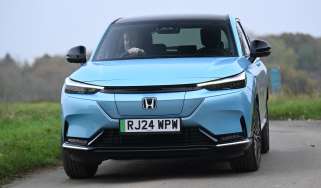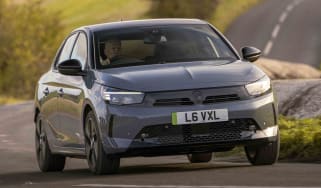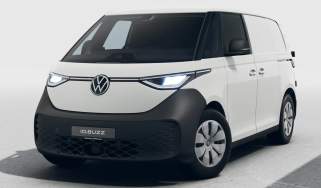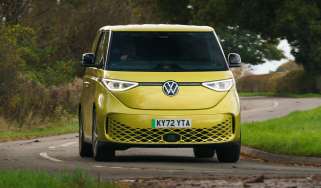Volkswagen ID. Buzz Cargo van review
The all-electric Volkswagen ID. Buzz van offers style and a useful long range for business buyers
If you're a business looking for a van that creates a positive impression wherever it goes, then the Volkswagen ID. Buzz Cargo could be it. It has retro-inspired looks that mean it stands out from rival vans, while its all-electric running gear offers the best driving range of any electric van currently for sale.
Under the skin, the VW ID. Buzz Cargo uses a version of the platform found under cars such as the ID.3, ID.4 and ID.5, and it shares its body with the passenger-carrying ID. Buzz. That means it's quite car-like to drive, while the large 77kWh battery means the ID. Buzz Cargo has an official WLTP driving range of up to 256 miles.
There's just one body style at launch, a panel van, while a longer model will be introduced in 2023. There are twin sliding side doors and either a tailgate or symmetrical twin doors at the rear, which open to reveal a 3.9 cubic-metre cargo area, although this is relatively small when compared with its rivals.
There's a plastic bulkhead separating the cargo area from the cab, where you'll find three-abreast seating. The ID. Buzz Cargo features a lot of back plastic trim, which marks it out from the passenger version, which has lighter coloured plastics, although the digital displays are largely the same.
Used - available now

2021 SEAT
Arona
13,926 milesManualPetrol1.0L
Cash £13,800
2022 Volkswagen
ID.3
32,354 milesAutomaticElectric
Cash £14,400
2023 Citroen
C5 Aircross
16,720 milesManualPetrol1.2L
Cash £17,387
2024 Kia
Stonic
11,381 milesManualPetrol1.0L
Cash £16,463Power comes from a 201bhp electric motor that drives the rear wheels. This features a single-speed transmission, which is operated via a drive selector on the right-hand steering column stalk.
There's a long list of safety kit as standard, thanks to those car-derived underpinnings. It includes autonomous emergency braking, tyre pressure monitors, front and rear parking sensors, driver and passenger airbags and cruise control with intelligent speed assist.
Some might argue that the VW ID. Buzz Cargo is a unique proposition, thanks to its head-turning looks, but competitive pricing and strong residual values mean it should be on any electric van buyer's shortlist. Main rivals for the ID. Buzz Cargo include the Stellantis group electric van line-up, comprising the Citroen e-Dispatch, Peugeot e-Expert, Vauxhall Vivaro Electric, Toyota Proace Electric and Fiat e-Scudo. Other options include the Mercedes eVito and Maxus e Deliver 3.
MPG, CO2 and Running Costs
The Volkswagen ID. Buzz Cargo has a bespoke electric vehicle platform, and this offers benefits in terms of efficiency when compared with rival electric vans that are converted from diesel models. There's space under the floor for a large 77kWh battery for starters, which is slightly ahead of the big 75kWh battery offered in the Stellantis Group electric vans. However, VW quotes a range of up to 256 miles on the combined WLTP test, which is around 50 miles ahead of the Stellantis vans. That's quite a margin for a battery that's only just a bit bigger, and means that the ID. Buzz Cargo is currently the electric van with the longest range for sale today. Even more impressive is that the WLTP City figure (which focuses on low-speed driving) is 356 miles.
As with other electric models, the ID. Buzz Cargo has different driving modes that help to recoup energy back into the battery when slowing down. There are just two settings, with the 'D' mode offering regular coasting when lifting off the throttle, while the 'B' mode offers stronger resistance. It's not enough to deliver one-pedal driving at low speeds, but does offer decent energy recovery and the equivalent of engine braking when coasting downhill, so you don't need to press the brakes in these circumstances. VW claims that the drive system takes care of braking at deceleration rates of up to 0.3g, while switching from this mode to the mechanical brakes is smooth.
There's a big battery on board, but VW has provided the ID. Buzz Cargo with fast-charging capability, too. Power sources of up to 170kW can be used, and at this charging rate, the battery can be topped up from five to 80 per cent capacity in around half an hour. If you're using an AC wallbox, a full charge takes seven hours 30 minutes from an 11kW source, or 11 hours from a 7kW supply.
Using VW's combustion-engined commercial vehicles as a reference, you might expect the ID. Buzz Cargo to command a premium over rival vans. However, that's not the case. It undercuts the 75kWh versions of the Stellantis group vans, while strong residual values mean it won't lose as much in depreciation as these vans, either.
Load Space and Practicality
While the VW ID. Buzz Cargo undercuts its rivals on price, the penalty that you pay is that it's not the roomiest van for its size. Measuring 4,712mm long and 1,985mm wide, it's slightly shorter than most medium-sized vans, and while VW claims that the ID. Buzz Cargo has enough floor space to fit two Euro pallets inside, the high position of the floor limits the van's capacity.
There's a maximum volume of 3.9 cubic metres on offer, which is a capacity that's equalled by maxi versions of vans in the small class. For reference, a Ford Transit Custom has around six cubic metres of space, and if you're going electric, then models such as the Citroen e-Berlingo and Renualt Kangoo e-Tech offer just as much space for a lot less cash.
Access is reasonable, rather than outstanding, too. You get two sliding side doors (not always standard fit on vans of this size) but the openings measure 756mm wide, which is narrower than most rivals. At the back, buyers can specify a top-hinged tailgate or twin doors with a 50:50 split. Going for the latter frees up some extra floor space if that's critical to you.
There's a floor length of 2,208mm in the tailgate-equipped van, while the twin-door version has a length of 2,232mm. At the other end of the cargo area is a hard plastic bulkhead, but there's no through loading facility. The floor has a maximum width of 1,217mm, and there is next to no wheelarch intrusion, largely because the floor is set quite high to make room for the 77kWh battery and rear-mounted electric motor.
The floor is tall enough that there are two steps into the cargo area, while there's also room on the offside behind a panel to stow the charging cables and keep them tidied away from the load area. There's a maximum height of 1,330mm inside, while the load lip at the rear is 632mm off the ground. Convenience features in the cargo area include six lashing eyes in the floor with two more on either side of the rear wheelarches, LED interior lighting and a 12-volt charging socket.
Reliability and safety
Since it's based on the Volkswagen Group's primary electric vehicle platform, the ID. Buzz Cargo's running gear should prove to be reliable, because it has had many millions of miles of development put on it. The ID. Buzz is a later arrival than models such as the ID.3 and ID.4, so any issues with their production should have helped with ID. Buzz assembly.
Those car-derived roots incorporate a suite of the latest safety tech, too. There are twin front airbags for starters – not all vans come with a passenger airbag as standard – while side and curtain airbags are also included. All three seats have full three-point seatbelts, while a belt reminder is also included.
There's autonomous emergency braking with cyclist and pedestrian detection, a driver tiredness monitor, tyre pressure monitors and VW's Car2X system, which allows the ID. Buzz Cargo to network with other compatible vehicles to offer real-time traffic information via a subscription service.
Dynamic road sign display and lane keeping are also included, as is eCall and front and rear parking sensors, while optional park assist can be programmed to remember up to five automated parking manoeuvres.
Driving and Performance
Power for the ID. Buzz Cargo comes from a 201bhp electric motor that's mounted at the back of the van and drives the rear wheels. It also makes 310Nm of torque, which is available from the moment you press the accelerator, and the ID. Buzz Cargo feels rapid when pulling away from a standstill, certainly a lot more potent than its Stellantis group rivals.
The ID. Buzz Cargo is very smooth for a van, which is another side effect of its car-derived platform. The suspension smothers bumps in the road very well, and this is a very relaxing place to spend time. There's no wind noise and road noise is also well suppressed, although bigger bumps can cause shudders to echo through the van's frame.
With so much power on tap, the ID. Buzz Cargo should make light work of any payload on board. VW also quotes a towing weight of one tonne for the van, although rivals can haul even more.
Cab and Interior
Where the ID. Buzz Cargo sets itself apart from rival vans is with its high-quality interior. No other commercial vehicle this side of a Land Rover Defender Hard Top is as plush. The Cargo model differs from the MPV version by having black plastics and upholstery, while that car's 'Play' and 'Pause'-branded pedals are replaced by conventional items.
The dashboard layout is largely the same, though, with a small digital instrument pod that moves with the steering wheel when you adjust it, while a large 10-inch colour touchscreen houses all the important functions.
The three-seat layout is wide enough for three adults, while the fabric trim looks like it will be sturdy for van life. The driver's seat is heated, which will help to save battery energy for driving on colder days, and storage is decent, too. There are double door bins and a long storage tray on top of the dashboard, a second shelf above the glovebox, cup holders at either end of the dashboard and a useful shelf below the central air vents with USB-C sockets and enough space for a smartphone.
The ID. Buzz Cargo is well specced for a van, because of its close relationship with the MPV variant. There's climate control, heated electric door mirrors, parking sensors front and rear, a multifunction steering wheel - although it's fitted with VW's frustrating touch-sensitive controls - wireless Apple CarPlay and Android Auto with online connectivity on offer, plus a first aid kit.
| Van dimensions | Height | Width | Length |
| L1H1 van | 1,899mm | 1,985mm | 4,712mm |
| Width including door mirrors: 2,211mm |
| Load area dimensions | Height | Width | Length | Volume |
| L1H1 van | 1,330mm | 1,217mm | 2,208mm | 3.9m3 |
Now read our list of the best electric vans...

